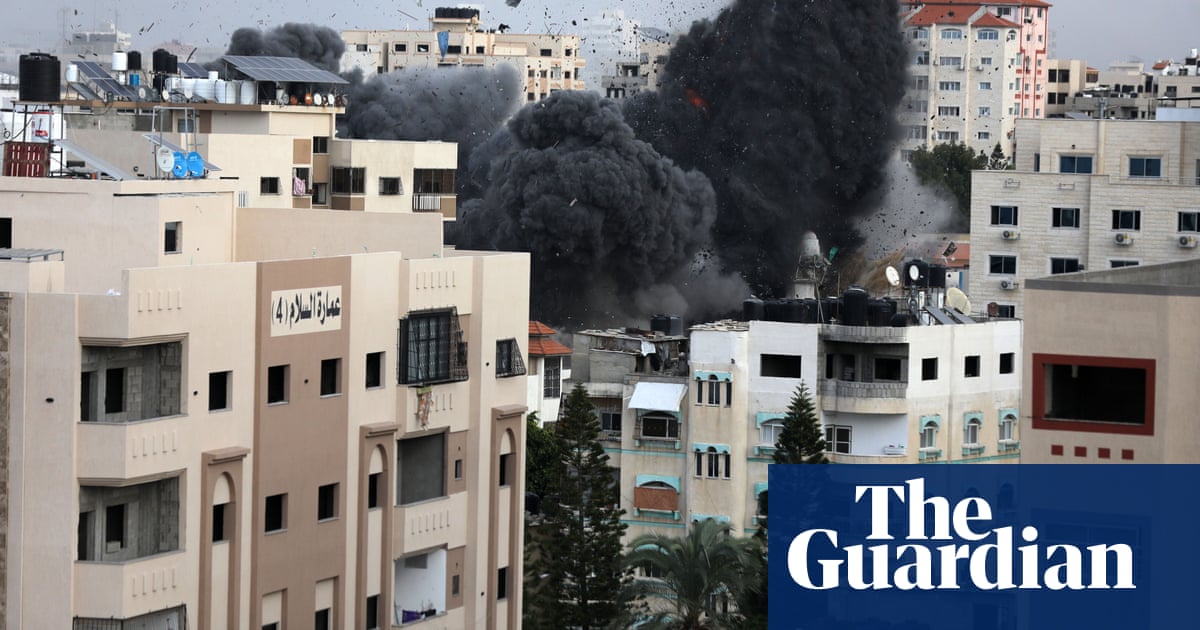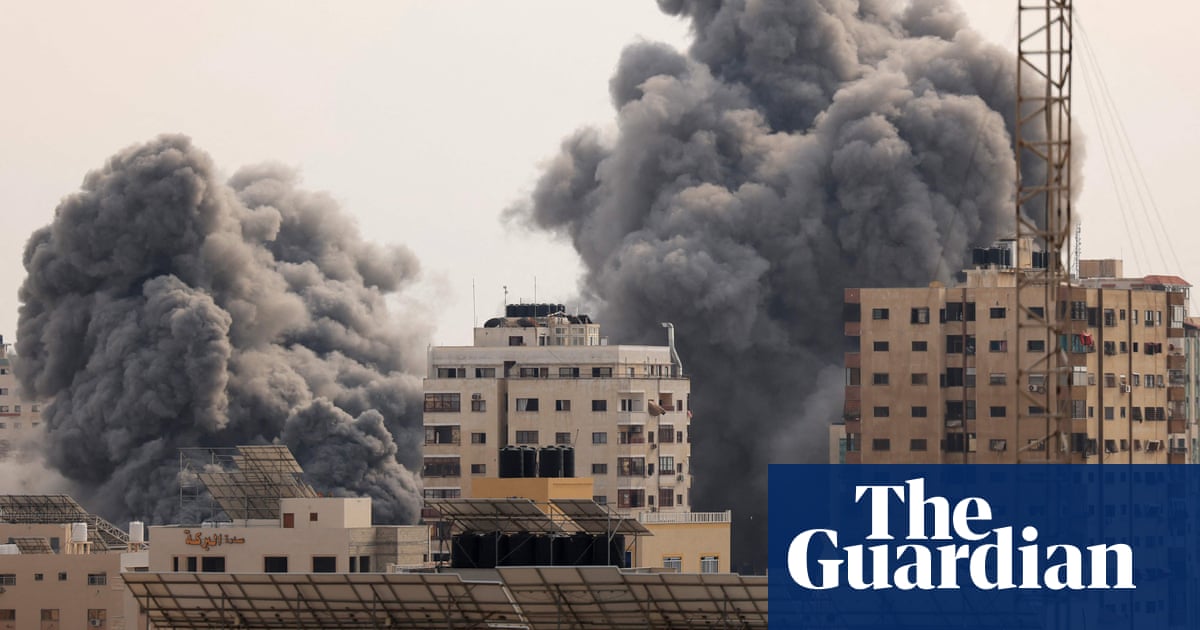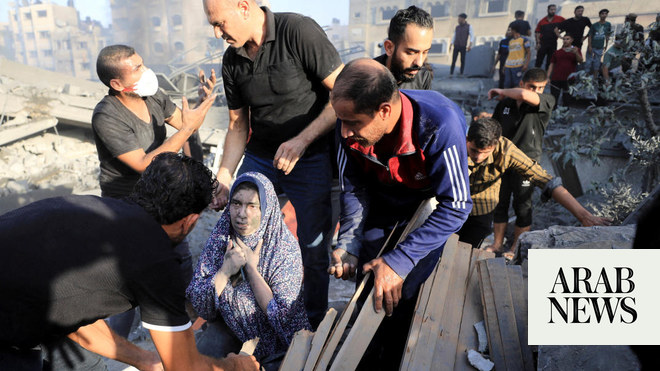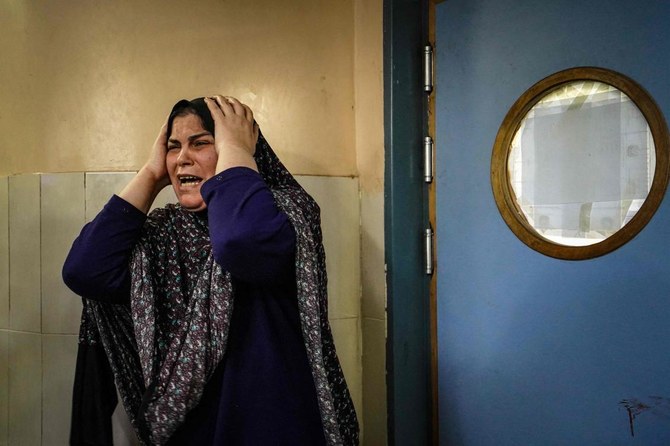
Civilians in Gaza sheltered in fear amid constant bombardments targeting residential buildings and communications infrastructure on Monday, as Israeli officials vowed to further tighten a punishing siege of the densely populated enclave.
“I can see the plumes of smoke from the bombings through my window,” said Rama Abu Amra, 21, speaking by telephone from south of Gaza City. She screamed as the bang of a nearby explosion could be heard.
“The bombs are falling all around us, we can’t even tell where they’re hitting. I can even smell the gunpowder now,” said the university student.
“It’s so scary. We don’t know what’s happening around us. We are so afraid about what will happen next,” she said. “For two days, we have woken up hearing bombs falling around us without knowing what’s happening. It has come as a total shock, we almost didn’t know if it was happening in real life or in a nightmare.”
Israeli forces hammered the Gaza Strip while battling Hamas militants in southern towns bordering the enclave. The airstrikes followed Saturday’s unprecedented incursion by Hamas militants who killed more than 800 Israelis and took at least 100 more hostage.
The Palestinian health ministry said 560 people, including children, had been killed in Israeli airstrikes on the Gaza Strip with at least 2,900 wounded.
Abu Amra described a sense of widening fear at the news that Israel had ordered what its defence minister, Yoav Gallant, labelled “a complete siege” of Gaza, including a shutdown of electricity and a block on the entry of food and fuel.
Israel’s infrastructure minister, Israel Katz, said he had given an order to cut the supply of water to Gaza, a slim strip of land that houses an estimated 2.3 million people, almost half of whom are children. “What was in the past, will no longer be in the future,” he said.
Gaza’s Al Mezan Center for Human Rights expressed outrage at the decision. “This is a collective punishment against 2 million Palestinians and a war crime of unprecedented dimensions,” it said.
The news of a complete shutdown of supplies followed an announcement by Israeli officials the previous day that they would cut the majority of electricity supplies to the enclave, where basic infrastructure was already at breaking point following repeated Israeli bombardments and a 16-year blockade that had vastly curtailed supplies of fuel, construction materials, medicines and food.
Palestinians in Gaza fear the increasing shutdown will affect their ability to communicate with loved ones nearby as well as the outside world, as internet access and electricity dwindled.
“We can use internet cards for a few hours, but they’re not as good as regular networks,” said Abu Amra. “I can’t reach my friends and relatives to know what they are doing or what will they do when they get that fateful call [from the Israeli military] to leave their homes. Everything has become more difficult. Adding to that, we have no electricity, it’s so weak I can’t charge my phone, to be connected with the world.”
She added: “It feels like everything is against us.”
As night fell, what remained of the telephone and internet connection was severed in large areas of the Gaza Strip as Israeli jets reportedly targeted a building belonging to the Palestine Telecommunications Company, according to the Turkish news agency Anadolu.
Israel instructed civilians in Gaza to evacuate neighbourhoods in the north of the enclave and claimed its forces had targeted Hamas infrastructure and members. But Ayed Abu Eqtaish, of the rights group Defense for Children International Palestine, said the heavy bombardments had targeted residential buildings.
“Most importantly for people in Gaza, the Israeli military is targeting residential buildings despite being fully aware that the person they want to target is not there,” he said. “But still they continue these operations to inflict harm on civilians, among them children.”
During past assaults, Israeli military forces routinely used a tactic they describe as “roof knocking”, in which a smaller explosive is dropped on a building as a warning for people to evacuate before it is destroyed. But reports from across the Gaza Strip suggested buildings were hit without either a warning or a message to those inside that their lives were in danger. An Israel Defence Forces spokesperson declined to comment on whether it had changed tactics regarding strikes in Gaza.
“From the information we have so far, they do not warn the residents of these buildings,” said Abu Eqtaish. “I think this is part of the Israeli military strategy to pressure civilians, targeting civilian areas to put pressure on people. It is clear from Israel’s tactic at this point that they are primarily targeting civilian infrastructure, mainly residential buildings.”
The United Nations previously said at least 123,000 people were displaced within Gaza, with that number expected to rise sharply in the coming days.
Abu Amra said a residential tower block close to hers was struck early on Monday morning without any warning.
“The building had many families in who were living there,” she said. “Now they lost their homes. The second building that was struck today was called the Jerusalem building, it was a five-floor building – all of them full of residents, living there with their families. Like those first group of families they lost their homes, I don’t know if they have anywhere to go ... Everything is terrifying, we are shocked by what’s happening around us. We don’t know what to do, what will happen next.”
She added: “They are trying to kill us, not with bombs but psychologically. I am terrified of losing my home, or a member of my family. We are so afraid of the night coming. It feels like the darkness is enveloping us.”












